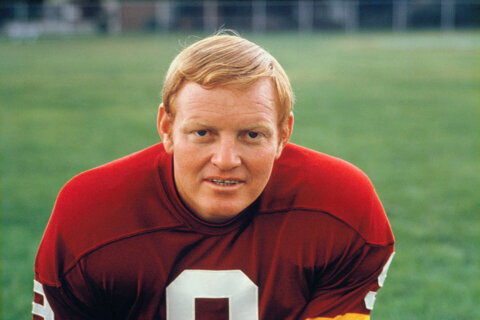WASHINGTON — Bear with me, this will all make sense in a moment.
Last year, Bryce Harper hinted that he should be the everyday center fielder for the Washington Nationals. Manager Matt Williams disagreed. Regardless of how things eventually played out, if you looked at the numbers at the time, Harper had a pretty strong case.
Now, the two have found themselves at odds over, of all things, an incident in a Spring Training game. Leading off the top of the fifth of Monday’s game against Houston, then a 1-1 tie, Astros outfielder Alex Presley singled to right field. Presely tried to stretch the hit to a double as Harper took his time fielding it. Harper, who possesses one of the better outfield arms in baseball, threw him out at second.
If you believe Harper, the deke was by design.
“I came up slow on that on purpose, just to see if he’d round the bag or something like that,” he said to the media. “That’s something I want to play this year, something I really want to do this year.”
This is an interesting piece of game-within-the-game strategy on Harper’s part. His manager, however, doesn’t see things that way.
“[Harper] needs to get to that ball quicker, then the guy doesn’t even go,” Williams said. “It’s a good throw, but if he pounces on that baseball, he doesn’t attempt to go.”
Yes, that’s true. If Harper fields the ball quickly, the runner will not attempt to advance. Most baseball fans can understand that. But why would you not want the runner to attempt to advance?
This is essentially a replication of a steal situation in terms of risk/reward. The runner is attempting to gain an extra base, at the risk of an out. As anyone who understands the game can tell you, a baserunner needs to be able to steal with a success rate of no less than 70 percent in order for the risk to pay off over time. This is because outs are more valuable than bases.
One could forgive a manager, especially a traditionalist (as Williams continues to show himself to be) for not wanting to take such a risk in a tie ballgame, where that particular runner could be the difference in the game. Both Tony Kornheiser and Mike Wilbon came to Williams’ defense on Pardon The Interruption Tuesday.
Meanwhile, many other media outlets jumped at the chance to continue to promote the idea of a Harper vs. Williams feud. On Thursday, it was revealed that Harper’s peers view him as the most over-rated player in the game. It’s easy to paint a brash, outspoken young man as the villain, and dismiss his thoughts on the matter.
All that’s fine, and the overrated part may well be true, though that’s at least as much the fault of the forces that surround Harper than the man himself.
But if you take away the blustering and the empty rhetoric, a simple truth remains: once again, Williams is wrong and Harper is right.
Harper understands that outs are more valuable, at least on the defensive end (perhaps not so much within the context of his own baserunning). And if you break it down mathematically, he only needs to throw the runner out above 30 percent of the time to make this play effective over the long haul. Anything better is a bonus.
The issue is that Harper, preparing for his third Major League Opening Day at 22 years of age, already gets this. His manager, a 17-year Major League veteran, and the manager tasked with guiding this team, apparently still does not.
That’s what should worry Nationals fans, more than any manufactured controversy between the two. As we all saw last year in the NLDS, when Williams locks himself into a rigid view of the game — pulling his ace with one out left to put in his closer, refusing to move his hottest hitter up from the six spot in the lineup, using his “seventh inning guy” in the highest leverage situation with the season on the line — the difference can be fatal for a team with championship aspirations.







